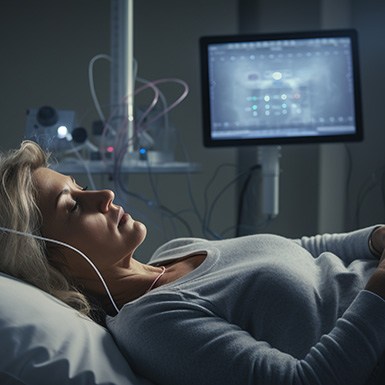Diagnosing Sleep Apnea – Silver Springs, MD
Understanding Your Sleep Problems
Obstructive sleep apnea (OSA) is an extremely common cause of drowsiness, exhaustion, and other symptoms. However, our Silver Springs team would never want to make assumptions about why you are struggling to feel well-rested. That is why we use a thorough process for diagnosing sleep apnea in our patients. Would you like to learn more about how we may be able to help you understand your sleep problems? Continue reading below.
Medical History

Our team should learn as much as possible about your symptoms. If you have kept a sleep journal that details your recent struggles, be sure to bring it with you to your appointment. It should include notes about your sleep habits, how you feel upon waking, and whether your partner has noticed that you snore.
We should also know about such things as:
- Any family history of sleep apnea or other sleep disorders.
- Risk factors for sleep apnea, such as obesity, smoking, and your age.
- Any illnesses or conditions that you have been diagnosed with, including diabetes and high blood pressure.
Physical Exam

There are some physical factors that can contribute to obstructive sleep apnea. For example, we may measure your neck to find out if you have a large neck circumference, which is associated with an increased OSA risk. We may also look for things like large tonsils, a narrow jaw, or other abnormalities that might interfere with the function of your upper airway during sleep.
A Sleep Study

If we believe you have sleep apnea, we cannot provide an official diagnosis. Rather, we can refer you for a sleep study, also known as a sleep test. During this non-invasive diagnostic procedure, you will spend a night in a laboratory. Sophisticated machinery will monitor your breathing and other vital statistics while you sleep. Afterward, a sleep specialist will review your results to determine if you have OSA or another sleep disorder. They can also tell you how severe your condition is.
Considering Other Health Issues

In some cases, additional testing is necessary to fully understand why a patient is not getting the high-quality sleep they need. For example, you could need some tests to look for hormonal abnormalities that might be affecting your nightly rest.
Additionally, it is important that you be completely honest about your lifestyle. If you have been using opioids or certain other medications, they might increase your risk of a sleep disorder. Spending time at high elevations may also have an impact on the quality of your sleep. Once we know about all such relevant facts, we may be in a position to provide effective treatment.
Diagnosing sleep apnea may be the first step on your path to improved health, so do not hesitate to visit our team to learn more about the diagnostic process and potential treatment options.
